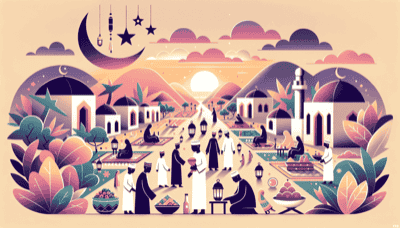We're here to help you keep count of the days to or since a date. Just click the button below and enter your chosen date to get started. Also choose the suggested days or search for a special day above #countingthedays

Eid al-Fitr, known as Id el Fitr in Nigeria, marks the end of Ramadan, the Islamic holy month of fasting. It is a significant religious holiday celebrated by Muslims across the country.
Eid al-Fitr has its origins in the Islamic prophet Muhammad's traditions. It begins with the sighting of the new moon, signaling the completion of Ramadan. This day of celebration is an expression of gratitude to Allah for the strength to complete the prescribed fasting.
On Id el Fitr, Nigerian Muslims commence their day with a special prayer called Salat al-Eid performed in congregation at mosques or open grounds known as Eid grounds. The prayer is usually followed by a sermon (khutbah), which reminds attendees about various Islamic teachings.
Following the prayers:
Charity (Zakat al-Fitr): Muslims are encouraged to give to charity before performing the Eid prayer. This act ensures that even the poor can celebrate.
Feasting: Families and friends come together to enjoy festive meals. Popular dishes include rice-based meals like Jollof rice and other local delicacies.
Dressing Up: People wear new or their best clothes often referred to as "Sunday best."
Socializing: Visiting relatives and neighbors is customary, fostering a sense of community and brotherhood.
Gifts: It's common for children to receive gifts or money, known as "Eidi," from elders.
Id el Fitr is a public holiday in Nigeria. Businesses are closed, allowing workers to celebrate with family and friends. Many Nigerian Muslims also take this opportunity to visit recreation spots or tourist attractions.
Throughout Nigeria, Eid al-Fitr serves not only as a time for celebration but also as an occasion for reflection, peace-making, and strengthening community ties.